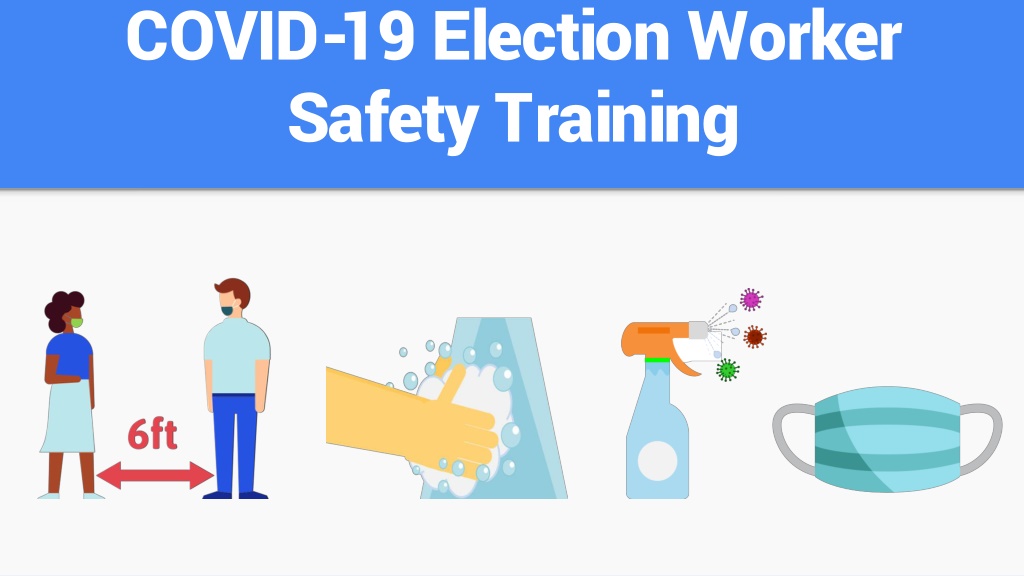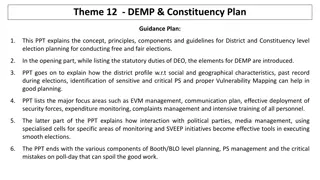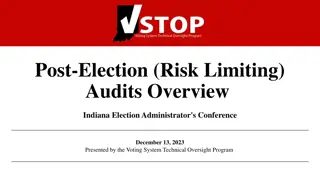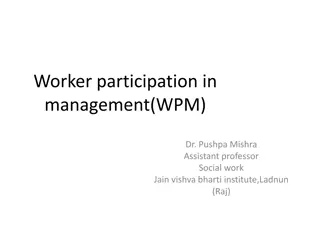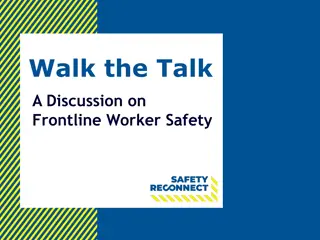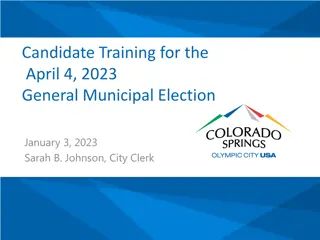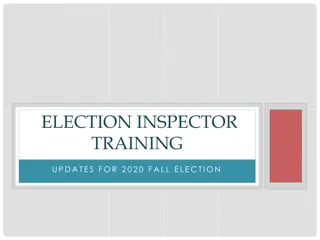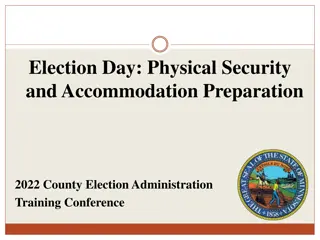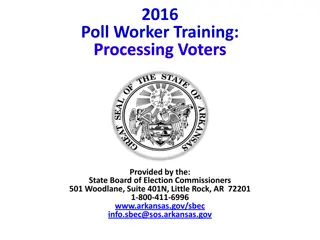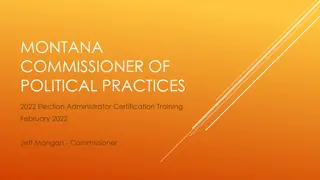COVID-19 Election Worker Safety Training Overview
This comprehensive training guide focuses on COVID-19 safety measures for election workers, covering topics such as recognizing symptoms, hand hygiene, physical distancing, mask usage, and site organization. It emphasizes the importance of worker health and safety during the election process.
Download Presentation

Please find below an Image/Link to download the presentation.
The content on the website is provided AS IS for your information and personal use only. It may not be sold, licensed, or shared on other websites without obtaining consent from the author.If you encounter any issues during the download, it is possible that the publisher has removed the file from their server.
You are allowed to download the files provided on this website for personal or commercial use, subject to the condition that they are used lawfully. All files are the property of their respective owners.
The content on the website is provided AS IS for your information and personal use only. It may not be sold, licensed, or shared on other websites without obtaining consent from the author.
E N D
Presentation Transcript
COVID-19 Election Worker Safety Training
Welcome & Thank You Welcome Thank You for Your Service
Focus Areas COVID-19 and You Election Workers and COVID-19 Organizing Voting Sites for Health and Safety Handling Voters Safely Election Observers
COVID-19 and You Knowing When You Are Sick Don t come to work if you have symptoms of COVID-19 Frequent cough Fever Difficulty breathing Chills Muscle pain Headache Sore throat Recent loss of taste or smell If you or someone you live with have been diagnosed with COVID-19 Call our office and let us know as soon as possible if you will be unable to serve, so we can find a replacement.
COVID-19 and You Wash hands frequently Scrub with soap and water for at least 20 seconds Use hand sanitizer o with at least 70% isopropyl or 60% ethyl alcohol Keeping Yourself Healthy Before You Serve Practice physical distancing of 6 feet, both at work and away from work Use face coverings or masks to cover mouth and nose
Physical Distancing 6 feet when possible Election Workers and COVID-19 Personal Prevention in the Voting Site Masks/Face Coverings Avoid touching the eyes, nose, or mouth Cover mouth and nose Handwashing Wash hands frequently Arrival/departure to and from Polling Place After Touching face Using restroom Blowing nose Sneezing/coughing
Masks/Face Coverings Cover mouth and nose Wash hands before and after use or adjustment Wash or replace each shift Election Workers and COVID-19 Protective Equipment use in the Voting Site Gloves wear gloves when Cleaning or disinfecting Curbside voting workers Wash hands before putting gloves on and after removing them Dispose properly after replacement
Organizing Voting Sites for Health and Safety Polling place layout Traffic flowing in a one-way circuit Ventilation is important
Ballot Station Organizing Voting Sites for Health and Safety Voting Booths or Machines Check-in Station Physical Distancing and the Circuit Cast Ballot Voter Exits Voter Comes into Polling Site
Organizing Voting Sites for Health and Safety Physical Distancing Visual cues Points in line Routes of the circuit Physical Distancing and Visual Cues WAY ONE Ventilation Fresh air intake
Cleaning and Disinfecting Routine cleaning of equipment and materials Supplies for workers and voters Professional cleaning (how you can help) Organizing Voting Sites for Health and Safety Cleaning & Disinfecting Work as a team and establish a schedule for cleaning of equipment and supplies
Organizing Voting Sites for Health and Safety Routine Cleaning Establish a schedule Cleaning & Disinfecting: Continued Sanitation Zone at Check-In For workers and voters Points of Regular Contact Surfaces Door handles
Organizing Voting Sites for Health and Safety Common Surface Cleaning Door handles Pens and/or styluses Reusable activation cards Voting booths & equipment Ballot scanners Electronic pollbooks Cleaning & Disinfecting: Before & During Voting
Handling Voters Safely Staying safe when interacting with voters, and the public. Safety throughout the voting process Safety when assisting voters with additional needs Clear communication is important
Arrival of Voter: Greeting Instructions Handling Voters Safely Face covering Physical distancing Hand sanitizer at entrance Ballot in scanner Hand sanitizer at exit Direction Follow signs or cues on floor Head to check-in stations Arrival at Voting Site
Check-In: Maintaining distance Hand sanitizer Ballot or activation card Handling Voters Safely Handling Routine Voters Dynamic Process: Directions to voting booth or machine, and to scanner and to exit Avoid voting booth lines Pause check-in if necessary Questions, machine issues and physical distancing
Voters Without Face Coverings (or voters electioneering with theirs): Do you have a face covering you can use? If you don t have one, we d be happy to provide one (if available) Following guidelines on face coverings and distancing can protect you and everyone else, so we do ask that you follow them Handling Voters Safely Handling Voters with Special Requirements: Voters without Face Coverings
Voters Who Refuse to Wear Face Coverings: Respecting the right to vote! These steps can help: Maintain physical distance of 6 feet Communication with other workers Seek backup if needed Handling Voters Safely Voter Who Refuse Face Coverings: De-escalation and Back-up NO!
Personal Safety Equipment Masks Gloves Handling Voters Safely Approach vehicle with supplies for voter Hand sanitizer Gloves Face covering Handling Voters with Special Requirements: Curbside Voting Maintain physical distance when possible
Election Observers Overall COVID-19 Safety Messaging Election observers must wear face coverings Observers without face coverings
Closing You re a Team Compromise and compassion Communication
